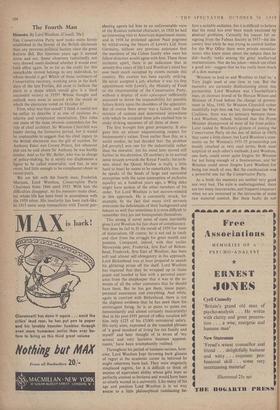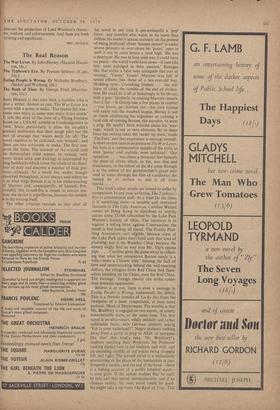The Fourth Man
Memoirs. By Lord Woolton. (Cassell, 30s.)
THE Conservative Party now looks more firmly established in the favour of the British electorate than any previous political faction since the great Reform Bill. But fourteen years ago it seemed down and out. Some observers (admittedly not very shrewd ones) doubted whether it would ever hold office again. In so far as the credit for this remarkable revival belongs to any individual, to whom should it go? Which of those architects of Conservative recovery, working away in the'dark days of the late Forties, did most to fashion the party in a shape which would give it a third successful victory in 1959? Whose thought and outlook were most in accord with the mood in which the electorate voted on October 8?
First, what was that mood? I think it would not be unfair to describe it as one of cautious in- sularity and complacent materialism. This rules out some of the most obvious contenders for the title of chief architect. Sir Winston Churchill was leader during the formative period, but it would be implausible to suggest that his chief legacy to the British electorate was the gift of caution. Sir Anthony Eden was Crown Prince, but whatever else can be said about Sir Anthony he was hardly insular. And as for Mr. Butler, who was in charge of policy-making, he is surely too diaphanous a figure to be called materialist, and has, in any event, had little enough to be complacent about in recent years.
We are left with the fourth man, Frederick Marquis, Lord Woolton, Conservative Party Chairman from 1946 until 1955. With him the difficulties disappear. As his memoirs make clear, his whole life has been lived in accordance with the 1959 ethos. His insularity has been rock-like. In 1915 some soap transactions with Tsarist pur- chasing agents led him to an unfavourable view of the Russian national character; in 1920 he had an interesting visit to American department stores; and in 1938 he protested against Nazi pogroms by withdrawing the buyers of Lewis's Ltd. from Germany, without any previous assurance that the members of the Cohen family who were his fellow directors would agree with him. These three incidents apart, there is no indication that in seventy-five years of life Lord Woolton's mind has ever been much occupied by events outside this country. His caution has been equally striking. He never accepted a job, whether it was his first appointment with Lewis's, the Ministry of Food or the chairmanship of the Conservative Party, without a display of nob o episcopari sufficiently sustained to throw the responsibility for possible failure firmly upon the shoulders of the appointer. But of course there never was a failure, and the mixture of caution and determined shrewdness with which he accepted these jobs enabled him to make striking successes of all three of them.
The first brought him great prosperity. It also gave him an almost unquestioning respect for businessmen's values. Even earlier than this, as a social worker, he had decided that 'the problem [of poverty] was one for the industrialist rather than the moralist,' but his mind later moved still further in this direction. Of snobbery in its normal sense (except towards the Royal Family; his arch- ness about the Queen Mother is really a little hard to bear) he seems to be remarkably free. But he speaks of the heads of large and successful enterprises with the same assumption of exclusive equality as, a hundred years ago, a Whig duke might have spoken of the other members of his order. Yet Lord Woolton is not narrow-minded in this approach. He is constantly struck, for example, by the fact that many civil servants overcome the deficiencies of their background and behave so well that sometimes it is even difficult to remember they are not businessmen themselves.
This strong if novel sense of caste inevitably gives Lord Woolton his fair share of complacency. Nor does he fail to fit the mood of 1959 for want of materialism. Of course, he is not red in tooth and claw from the struggle for great wealth and , position. Compared, indeed, with that earlier Merseyside peer, Frederick, first Earl of Birken- head, Frederick, first Earl of Wootton, has been soft and almost self-abnegatory in his approach. Lord Birkenhead was at least prepared to snatch his glittering prizes off the shelf. Lord Wootton has required that they be wrapped up in tissue paper and handed to him with a personal assur- ance from the shopkeeper that it was in the in- terests of all the other customers that he should have them. But he has got them, tissue paper, personal assurances and everything. And while, again in contrast with Birkenhead, there is not the slightest evidence that he has used them for extravagant living, he is at pains to point out (unnecessarily and almost certainly inaccurately) that in his post-1951 period of office taxation left him only £125 of his £5,000 ministerial salary. His early aims, expressed in the rounded phrases of 'a good standard of living for my family and myself' and later thought of in terms of 'my several and very lucrative business appoint- ments,' have been triumphantly realised.
Throughout his period of business success, how- ever, Lord Woolton kept throwing back glances of regret at the academic career he believed he might otherwise have had. They were singularly misplaced regrets, for it is difficult to think of anyone of equivalent ability whose gifts were so perfectly attuned to business and would, have been so utterly wasted in a university. Like many of his age and position Lord Woolton is in no way averse to a little philosophical ruminating be-
fore a suitable audience, but it is difficult to believe that his mind has ever been much exercised by abstract 'problems. Certainly his reason for re- signing from the Fabian Society in 1917—his dis- covery that while he was trying to control leather for the War Office there were private manufac- turers who knew more about the subject than he did—hardly ranks among the great intellectual reorientations. Nor do his jokes—which are often a good test—suggest that he has really been much of a don manqué.
'Winston to lead us and Woolton to feed us,' a Tory jingle used at one time to run. But the memoirs are curiously disillusioning about this partnership. Lord Woolton was Chamberlain's man, an intimate friend of Sir Horace Wilson and Minister of Food before the change of govern- ment in May, 1940, Sir Winston Churchill rather doubtfully kept him ota but, throughout the War Coalition, there was no intimacy between them. Lord Woolton, indeed, believed that the Prime Minister disapproved of most of his food policy. Later (aided by Woolton's gesture of joining the Conservative Party on the day of defeat in 1945) they came a little closer; but Lord Woolton's com- ments on Sir Winston's 1951-55 premiership are mostly couched in very cool terms. Both were sceptical of each other's methods. Lord Woolton, one feels, could never quite forgive Sir Winston for not being enough of a businessman, and Sir Winston could never forgive Lord Woolton for being too much of one. But the combination was a powerful one for the Conservative Party.
As a book the memoirs are neither very good nor very bad. The style is undistinguished, there are too many inaccuracies, and frequent longueurs when we are immersed in the intricacies of some raw material control. But these faults do not obscure the projection of Lord Woolton's charac- ter, outlook and achievements. And these are both striking and significant.
ROY JENKINS











































 Previous page
Previous page